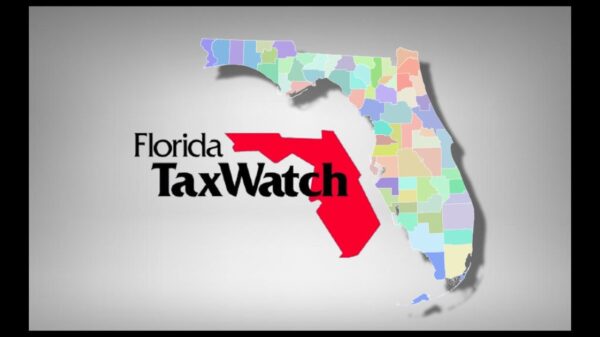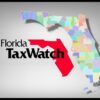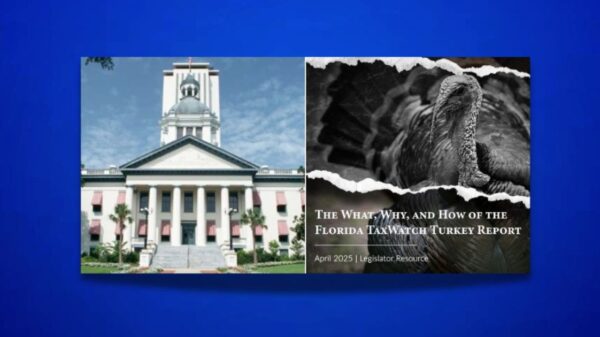This week, Florida TaxWatch released a list of priorities for the 2023 Legislative Session, which begins on Tues., March 7 and is scheduled to adjourn on Fri., May 5. The list reflects a range of issues that the independent, nonpartisan taxpayer research institute has examined and will continue to closely monitor during the upcoming session. It includes:
Promoting discipline, transparency, and accountability throughout the appropriations and public policy processes
Accounting for inflation and addressing affordability on behalf of hard-working Floridians
Investing in infrastructure to ensure Florida remains competitive and achieves long-term economic success
Leveraging Florida’s natural appeal and business-friendly climate to sustain recent growth
Florida TaxWatch President and CEO Dominic Calabro said, “Florida is the best place to work, be it remotely or in a traditional office setting, and we’ve always known it’s the best place to play, with idyllic temperatures and breathtaking beaches around every corner. But lately, whenever I ask someone who recently moved here, ‘Why Florida?’, they tell me it’s because this is the place where they can realize their dreams; this is the place where their families can not only grow, but thrive.
“As an almost lifelong Floridian – my family moved here when I was 10 years old – and the leader of Florida TaxWatch for nearly all of its 40-plus year existence, I can attest that this is truer now than ever before. Despite its best efforts, COVID-19 did not set us back. In fact, from a fiscal perspective, it made us stronger, thanks in large part to Governor Ron DeSantis, Senate President Kathleen Passidomo, House Speaker Paul Renner, and their respective chambers’ commitment to allowing us to pursue our passions. And now, with the influx of businesses and new residents across the state, the 2023 Florida Legislature has additional funding available to invest in projects that will enable us to maintain this momentum, while ensuring long-term economic success,” Calabro added. “Of course, the appropriations and public policy processes are nuanced, and there can be so many different, yet equally important (and understandably complex) issues in play at any given time during the legislative session. That’s why, as the ‘eyes and ears’ of taxpayers, Florida TaxWatch has once again proudly identified several taxpayer priorities, and we will continue to serve as a trusted, go-to resource for leaders, policymakers, staff, and media from the time the gavel bangs next week, to Sine Die, and beyond.”
Calabro also said the following this week on Florida TaxWatch’s agenda:
Promoting discipline, transparency, and accountability throughout the appropriations and public policy processes
Thanks to strong, strategic leadership, Florida has continued to experience significant economic growth. With this growth, as well as increased tax revenue from the implementation of E-Fairness legislation in 2021 – a longtime Florida TaxWatch priority – and some remaining non-recurring federal funding, the state has additional dollars available to appropriate during the 2023 Legislative Session.
As has come to be expected, Florida TaxWatch will continue to advise legislative leaders to maintain discipline, transparency, and accountability throughout the appropriations and public policy processes. This focus is intended to provide for the highest taxpayer value possible, which includes ensuring an appropriately sized state government can do the most good with the resources at hand and ultimately take less from hard-working men, women, and families in the long run.
Moreover, during the appropriations process, it will be critical for the legislature to consider overhauling the state procurement system, as Florida TaxWatch has recommended time and time again, in order to promote open, fair competition and support the best interests of both taxpayers and all Floridians who depend on state services to lead full, productive lives.
Accounting for inflation and addressing affordability on behalf of hard-working Floridians
In the last year, hard-working Floridians have experienced the impact of record inflation on gas, groceries, housing, and everything in between. There is no population left unaffected, from young professionals rising in their careers to seniors just trying to enjoy their best years, which is why affordability must be addressed.
Senate President Kathleen Passidomo’s resolve to address affordable workforce housing through her Live Local plan – outlined in Senate Bill 102, sponsored by Sen. Alexis Calatayud (R-Miami) – is commendable and of the utmost importance. As Florida TaxWatch has found through extensive research on housing, rent prices across the state increased 36 percent from January 2020 to December 2022 alone, further burdening household budgets that were already straining from inflation.
Additionally, Florida TaxWatch will be carefully watching to see if and how the end of the public health emergency, and the Medicaid unwinding plan in particular, will disrupt affordable health coverage for low-income individuals and especially children.
Other affordability-related measures on Florida TaxWatch’s radar include supporting vulnerable youth and families and strengthening the privatized system care established to protect them; positioning safety net programs as opportunities, not traps; championing smart justice initiatives; implementing common-sense tort reform; and mitigating property insurance risks. The taxpayer research institute will also advocate for the legislature to evaluate the effectiveness of everyday taxes, like the Communications Services Tax and the Business Rent Tax.
Investing in infrastructure to ensure Florida remains competitive and achieves long-term economic success
Florida’s population has been rapidly increasing, with an estimated 800 to 1,000 new residents arriving every day, and it will continue growing at a steady pace, placing considerable demands on public infrastructure in the years ahead. The 2023 Florida Legislature must fast track infrastructure projects (like transportation investments and workforce housing) now, during a time when the state has funding available, to ensure Florida remains competitive and achieves long-term success.
This is especially important because, as Florida TaxWatch’s research has shown, by 2039, a continued underinvestment in Florida’s infrastructure at current rates will have serious economic consequences, including $10 trillion in lost Gross Domestic Product (GDP), more than three million lost jobs, and $2.4 trillion in lost exports, which will cost the average Florida household $3,300 a year.
Building roads and bridges should obviously be a top priority for the state’s legislative leaders. However, Florida TaxWatch encourages them to also expand broadband to allow for increased access to telehealth, online education, and remote work, while concentrating on strengthening cybersecurity as well.
Finally, there must be a renewed emphasis on economic growth programs, such as Enterprise Florida and Visit Florida, as well as PreK-12 and post-secondary education systems. Talent is a core driver of competitiveness, and Florida must have a seat at the negotiating table in order to attract and retain the best and brightest.
Leveraging Florida’s natural appeal and business-friendly climate to sustain recent growth
When it comes to natural appeal, no other state can compete with Florida and its beautiful beaches, lakes, and springs, scenic hills and trails, and expansive parks like the Everglades National Park. But in addition to that, it is the business-friendly climate that attracts so many people to the state.
Along with the “open for business” and live-work-play approaches, Florida also has a favorable tax system. Most notably, there is no state income tax, and under Governor DeSantis’ administration, there has been a variety of new sales tax exemptions and holidays introduced, including a permanent sales tax exemption for baby and toddler necessities and an extended (now two-week, instead of one-week) Back-to-School sales tax holiday.
During the 2023 Legislative Session, Florida TaxWatch will support the advancement of measures that would empower the Florida Department of Revenue to collect appropriate taxes, without compromising important taxpayer protections. Ideally, measures would also be clarified to deter entrepreneurial property appraisers who ignore precedence or go back on promises, which is often seen with the taxation of government leaseholds.
Furthermore, as a leader on high-profile issues like data privacy and local ordinances, Florida TaxWatch will continue to advocate for decisions to be made at the local level, as long as they are done so in a way that maintains business freedom and opportunity for success.





















